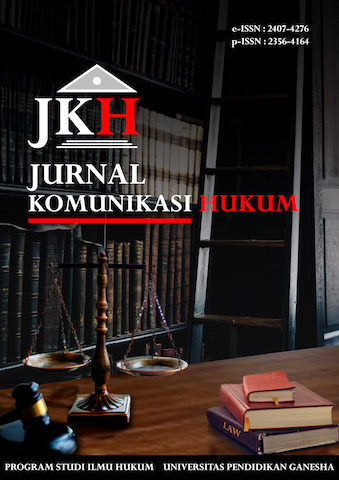PERAN MAHKAMAH KONSTITUSI SEBAGAI PENGAWAL DEMOKRASI DI INDONESIA
DOI:
https://doi.org/10.23887/jkh.v8i2.51180Abstract
The role of the Constitutional Court (MK) as the guardian of democracy can be seen from its decisions related to judicial review and dispute resolution on election results. Problems: (1) What is the role of the Constitutional Court in guarding democracy in Indonesia so far? (2). How to increase the role of the Constitutional Court as the guardian of democracy in Indonesia? This writing uses a normative juridical method. The results of the study, the role of the Constitutional Court as the guardian of democracy: (1) the indicators are judicial review decisions that contribute to the development of democracy in Indonesia, such as Decision: No. 011-017/PUU-I/2003; No. 013-022/PUU-IV/2006; No. 013-022/PUU-IV/2006; No. 6/PUU-V/2007 and others. Meanwhile, the Constitutional Court's Decision regarding the resolution of disputes over the phenomenal election results is Decision No. 41/PHPU.D-VI/2008 which applies the concept of systematic, structured and massive election violations. However, there is also a conservative Constitutional Court Decision in Decision No. 51-52-59/PUUVI/2008 and Decision No. 53/PUU-XV/2017 where the Constitutional Court rejected the request to cancel the presidential threshold. (2) to increase its role, the Constitutional Court must develop a consistent pattern of decision-making to realize constitutional justice and not only rely on formal legality.
Downloads
Published
How to Cite
Issue
Section
License
Authors who publish with this journal agree to the following terms:- Authors retain copyright and grant the journal right of first publication with the work simultaneously licensed under a Creative Commons Attribution License that allows others to share the work with an acknowledgement of the work's authorship and initial publication in this journal.
- Authors are able to enter into separate, additional contractual arrangements for the non-exclusive distribution of the journal's published version of the work (e.g., post it to an institutional repository or publish it in a book), with an acknowledgement of its initial publication in this journal.
- Authors are permitted and encouraged to post their work online (e.g., in institutional repositories or on their website) prior to and during the submission process, as it can lead to productive exchanges, as well as earlier and greater citation of published work (See The Effect of Open Access).
Authors who publish with this journal agree to the following terms:
- Authors retain copyright and grant the journal right of first publication, with the work [SPECIFY PERIOD OF TIME] after publication simultaneously licensed under aCreative Commons Attribution License that allows others to share the work with an acknowledgement of the work's authorship and initial publication in this journal.
- Authors are able to enter into separate, additional contractual arrangements for the non-exclusive distribution of the journal's published version of the work (e.g., post it to an institutional repository or publish it in a book), with an acknowledgement of its initial publication in this journal.
- Authors are permitted and encouraged to post their work online (e.g., in institutional repositories or on their website) prior to and during the submission process, as it can lead to productive exchanges, as well as earlier and greater citation of published work (See The Effect of Open Access).












